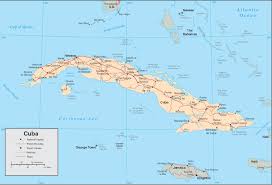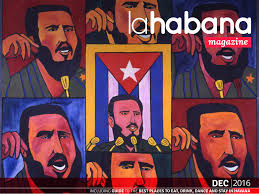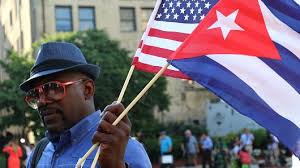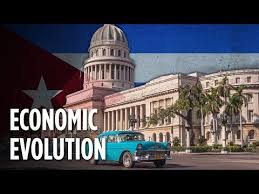With the death of Fidel Castro, Cuba has the opportunity for a fully invested relationship with the United States. Obviously, this projected relationship depends on the policies ushered forward jointly between Raul Castro and President Donald Trump, along with the current Republican dominated U.S. Congress. For fifty years, no United States President had formal interaction with its closest non-border international neighbor. All of this changed when President Barak Obama shifted the international paradigm, allowing for both political interaction and U.S. tourism based on educational purposes. Following the announcement, Americans have flocked to the island state to physically see for themselves Cuba. Although the country has a wealth of human and natural resources, it remains standing still in the 1950s.
 However the altruistic desires to see a country untouched by the free market and capitalism, these tourists miss the big picture of Cuba’s potential, much like Castro who in his arrogance refused to allow for the conversion of Cuba’s economy from pure communism to one reflecting an integration of free market principles. This elevated greatly after their largest trade partner, the USSR, failed in 1991; the new country Russia turned to the free market after the disbandment of the Soviet Union. Based on the demand drivers, and limited formal supply, Cuba has the potential for an economy that can benefit from U.S. hospitality real estate investment.
However the altruistic desires to see a country untouched by the free market and capitalism, these tourists miss the big picture of Cuba’s potential, much like Castro who in his arrogance refused to allow for the conversion of Cuba’s economy from pure communism to one reflecting an integration of free market principles. This elevated greatly after their largest trade partner, the USSR, failed in 1991; the new country Russia turned to the free market after the disbandment of the Soviet Union. Based on the demand drivers, and limited formal supply, Cuba has the potential for an economy that can benefit from U.S. hospitality real estate investment.

 Residing in the Caribbean Sea, Cuba has the potential of becoming the tourism and hospitality goliath in those blue waters. Hospitality investment in Cuba will continue to be questionable as long as the government retains central economic control. Although the Cuban government has slowly minimized the restrictions on foreign direct investment and enacted Investment Law No. 77 which defines the privileges and guarantees for foreign investors, labor and tax considerations, potential investment venues, and the allowable forms of permissible foreign-owned business, many questions remain about how these concerns will be addressed now after Fidel Castro’s death. One of the best historical models for Cuba would be China. In that manner, Cuba would evolve to promote its economic prosperity. The largest questions for potential U.S. hospitality investment revolves around the following: finance, human resources, partnership between the private and public sectors, real estate, the gaming industry, property rights, and dispute resolutions.
Residing in the Caribbean Sea, Cuba has the potential of becoming the tourism and hospitality goliath in those blue waters. Hospitality investment in Cuba will continue to be questionable as long as the government retains central economic control. Although the Cuban government has slowly minimized the restrictions on foreign direct investment and enacted Investment Law No. 77 which defines the privileges and guarantees for foreign investors, labor and tax considerations, potential investment venues, and the allowable forms of permissible foreign-owned business, many questions remain about how these concerns will be addressed now after Fidel Castro’s death. One of the best historical models for Cuba would be China. In that manner, Cuba would evolve to promote its economic prosperity. The largest questions for potential U.S. hospitality investment revolves around the following: finance, human resources, partnership between the private and public sectors, real estate, the gaming industry, property rights, and dispute resolutions.
FINANCE
 After Fidel completed his takeover of the island nation from the U.S. friendly Bautista, he enacted a financial system to insure government controls to prevent private industry corruption (government corruption persisted from the highest offices). At the bottom of the economic hierarchy were the Cubans who remained as the workforce. They are paid in the Cuban Peso (CUP) that allows them to fulfill living expenses, and foreign nationals who can purchase pre-determined home supplies. On the other hand, foreign nationals use the Cuban Universal Currency (CUC) for most home supply purchases, and it is the currency for payment by hospitality and tourism guests, and between most foreign businesses. The conversion of the currencies with respect to the USD was most recently:
After Fidel completed his takeover of the island nation from the U.S. friendly Bautista, he enacted a financial system to insure government controls to prevent private industry corruption (government corruption persisted from the highest offices). At the bottom of the economic hierarchy were the Cubans who remained as the workforce. They are paid in the Cuban Peso (CUP) that allows them to fulfill living expenses, and foreign nationals who can purchase pre-determined home supplies. On the other hand, foreign nationals use the Cuban Universal Currency (CUC) for most home supply purchases, and it is the currency for payment by hospitality and tourism guests, and between most foreign businesses. The conversion of the currencies with respect to the USD was most recently:
24 CUP = 1 CUC
1 CUC = $0.87 USD
With foreigners using a currency much more valuable, a black market to be compensated in CUC exists. Additionally, tipping occurs on hospitality properties in CUC which both motivates better service, and employment in the sector.
Even as banks in South Florida, like Stonegate Bank secure debit card capabilities for tourists traveling to Cuba because they act as correspondents to Cuban government, an expectation persists that U.S. and other foreign banks will shortly be awarded the right to have banking operations within Cuba’s borders. The positive first step of opening the gate to allow U.S. bank correspondence speaks well to future financial investment, particularly when Cuba lacks private sector employment in banking, finance, insurance, law, development, and management. Next potential steps for Cuba within the banking spectrum could include becoming associated with global stock markets. Fidel had deep disgust and fear of the equities and securities markets.
With his passing, the Cuban banking system could allow for an investment system that allows for foreign investors to secure debt instruments to finance sorely needed infrastructure projects, and either redevelopment (highlighted historical preservation) or ground-up development hospitality projects. Projects that would both increase needed supply, and initiate job creation for Cuba’s highly skilled labor. Without the cloud of Fidel’s desire to keep Cuba from experiencing the economic growth through competitive business, Cuba has the opportunity to receive a direct infusion of U.S. equity and debt investment within the hospitality sector once they move to a singular currency, and decide to conform to the global banking and accounting practices.
HUMAN RESOURCES
As mentioned previously, Fidel enacted employment barriers through the communist system modeled after the USSR. In this system, the Cuban population gained focused skills in particular trades and services (Cuban health care professionals are at the top of their profession globally). However, all Cuban are employees of the nation, and not the private sector.
The education system functioned as a builder of the Cuban people, unlike communism that prevented business growth and competition. Both Fidel and Raul Castro both attended elite catholic schools in their youth. Although, their first initiatives led them to close all private schools, the majority being catholic schools. This fit Fidel’s desire to remove the influence of Catholicism from the country because it represented Spain’s imperial hold over the country.
 Now having a vision for Cuba’s education future, Fidel insured that his opposition would be minimized. His intentions to provide raises to teachers’ salaries and improve rural schools to level the playing field, took a back seat to Fidel desire to use education as a role to solidify the revolution. Underlying universal education for all Cubans, Fidel enforced all who took advantage of the system must become the loudest voices of pride towards the government; education became a propaganda tool. The literate population was loyal to Fidel’s government. This increased educated population led to 20,000 medical students participating in the education system since 1999.
Now having a vision for Cuba’s education future, Fidel insured that his opposition would be minimized. His intentions to provide raises to teachers’ salaries and improve rural schools to level the playing field, took a back seat to Fidel desire to use education as a role to solidify the revolution. Underlying universal education for all Cubans, Fidel enforced all who took advantage of the system must become the loudest voices of pride towards the government; education became a propaganda tool. The literate population was loyal to Fidel’s government. This increased educated population led to 20,000 medical students participating in the education system since 1999.
With a highly educated and skilled labor force, the Cuban population has the ability to provide the essential human resources for the potential hospitality investment within their country. Currently, national agencies not only hire people as apart of the national work force, but they also negotiate wages, hours, and other essential employment terms. These controls constrict business in their selection of the brightest and best fit for the work, and negotiations of wages to receive work based on the expertise. Obviously, the aforementioned controls leads to poor compensation predicating low levels of satisfaction at hospitality services. It is the increased professionalism in the hospitality sector that should receive a huge lift from potential global sector policies by Raul Castro and the Cuban government with Fidel’s death.
PUBLIC/PRIVATE PARTNERSHIP
 When a private individual or corporation considers participating in real estate hospitality investment projects in Cuba, they have one large over-arching concern, the 50-50 joint venture requirements with the Cuban government. Melia Hotels of Spain has enjoyed a successful partnership, but that is not the standard. The aforementioned Foreign Investment Law No. 77 does not a limit on foreign contribution, but the law does prohibit hospitality venture consisting of solely foreign investment. Therefore, if developers like The Related Companies wanted to pursue a hospitality project with any of their new hospitality brands, the Cuban government would retain more than 50% of the capital.
When a private individual or corporation considers participating in real estate hospitality investment projects in Cuba, they have one large over-arching concern, the 50-50 joint venture requirements with the Cuban government. Melia Hotels of Spain has enjoyed a successful partnership, but that is not the standard. The aforementioned Foreign Investment Law No. 77 does not a limit on foreign contribution, but the law does prohibit hospitality venture consisting of solely foreign investment. Therefore, if developers like The Related Companies wanted to pursue a hospitality project with any of their new hospitality brands, the Cuban government would retain more than 50% of the capital.
Considering the tax implications of repatriation of the profits, U.S. based developers would have hard time making any project pencil out. As with the shift to the franchise model, major hotel brands like Marriott have signed franchise contracts with operators in Cuba to manage properties to mitigate risk. Additionally, the opportunistic investment funds and developers will have to either invest funds into infrastructure projects because the quality of things most wealthy Americans take for granted who desire to make their new vacation paradise will not have access (i.e. roads, internet access, electricity). Moving forward the Cuban government will have to provide the security from risk to U.S. hospitality investment firms. Insuring that the potential firms investment in the public infrastructure will either preclude them from having to hand-over 50% of the capital to the government, or not have the government included in the hospitality project at all.



